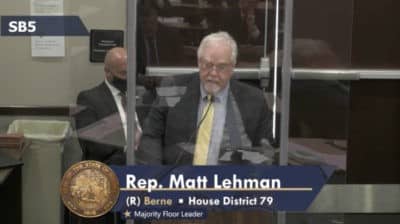
UPDATE: Gov. Eric Holcomb has vetoed Senate Bill 5, which would curb the authority of local health officials over mandates like those implemented during the coronavirus pandemic.
In issuing the veto Tuesday afternoon, Holcomb wrote in a letter to Senate President Pro Tempore Rodric Bray: “Right now it is critical that we maintain our local health expertise, flexibility and all tools needed to respond. We must not do anything that jeopardized this as our heroic local health officials remain critical in the months to come as we accelerate our recovery and work to vaccinate many more Hoosiers.”
***
EARLIER: Legislators are waiting on the governor to take action on Senate Bill 5, a bill to require approval for Indiana counties before implementing their own health mandates, impacting how the state handles the ongoing pandemic.
At the moment, health officials have the power to change mandates as they see fit. However, SB 5, authored by Sen. Chris Garten, R-Charlestown, and sponsored in the House by Rep. Matt Lehman (above), would require local health officials to get permission from elected officials, such as a mayor or county council, before applying the mandates to the community.
In Indiana, Gov. Eric Holcomb lifted COVID-19 mask mandates on April 6, but counties can still follow their own local mandates. Holcomb’s executive order says that government officials cannot follow guidelines less restrictive than those declared in the state but they can be more restrictive—like Marion County, which still requires masks.
SB 5 is the only bill passed by both chambers that still needs to be decided on by Holcomb.
According to The Indianapolis Star, Garten views the bill as a pro-local control bill.
“This language is not a knee-jerk reaction or a combative response to any enforcement action,” Garten said in the article. “Senate Bill 5 simply creates a structural check and balance on a position that has unparalleled authority under these emergency orders.”
However, the Indiana Public Health Association (IPHA) has spoken about the negative impact SB 5 will make because health restrictions currently in place will no longer be valid and will have to be lifted.
The main worries of health officials within the Indiana State Association of County and City Health Officials and the IPHA is leaving the decision concerning safety mandates to elected officials, “most of whom lack the expertise needed to properly engage in unusually complex public health subject and regulatory matters,” said the statement.
Dr. David Welsh of the IPHA is worried about the time it will take for elected officials to look over the petition to change health mandates in the county.
“Say there’s a public health issue at a business and they’re ordered to stop doing whatever the problem is and [the business] decide to appeal, well, that appeal can take a week or two for them to respond,” Welsh said. “So you might have literally months of something going on that could be putting the public at risk.”
Holcomb didn’t comment on the delay. He has until Wednesday to take action on the bill; if he doesn’t, the bill will automatically become a law, effective immediately.
Carolina Puga Mendoza is a reporter for TheStatehouseFile.com, a news website powered by Franklin College journalism students.